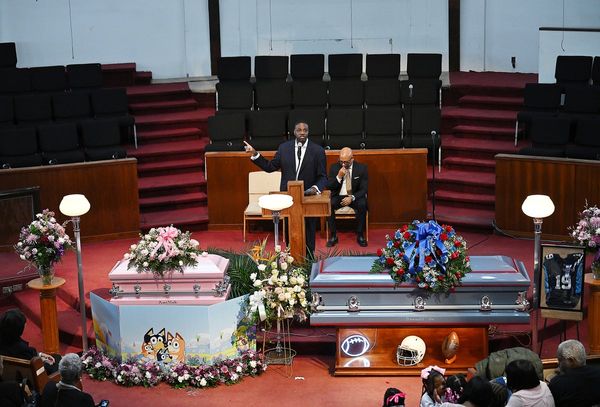
Turkey has pressed European leaders to make fresh cash pledges to prevent tens of thousands of refugees from leaving the country and trying to reach Europe amid a Russian-Syrian offensive in north-west Syria.
After intense bombardment in Idlib province last month, Turkey’s president, Recep Tayyip Erdoğan, encouraged thousands of refugees in the country to move on towards the Greek islands and the Baltics, in a repeat of the surge to Europe in 2015.
Who is in control in north-eastern Syria?
Until Turkey launched its offensive there on 9 October, the region was controlled by the Syrian Democratic Forces (SDF), which comprises militia groups representing a range of ethnicities, though its backbone is Kurdish.
Since the Turkish incursion, the SDF has lost much of its territory and appears to be losing its grip on key cities. On 13 October, Kurdish leaders agreed to allow Syrian regime forces to enter some cities to protect them from being captured by Turkey and its allies. The deal effectively hands over control of huge swathes of the region to Damascus.
That leaves north-eastern Syria divided between Syrian regime forces, Syrian opposition militia and their Turkish allies, and areas still held by the SDF – for now.
On 17 October Turkish president, Recep Tayyip Erdoğan, agreed with US vice-president Mike Pence, to suspend Ankara’s operation for five days in order to allow Kurdish troops to withdraw. The following week, on 22 October, Erdoğan and his Russian counterpart, Vladimir Putin agreed on the parameters of the proposed Turkish “safe zone” in Syria.
How did the SDF come to control the region?
Before the SDF was formed in 2015, the Kurds had created their own militias who mobilised during the Syrian civil war to defend Kurdish cities and villages and carve out what they hoped would eventually at least become a semi-autonomous province.
In late 2014, the Kurds were struggling to fend off an Islamic State siege of Kobane, a major city under their control. With US support, including arms and airstrikes, the Kurds managed to beat back Isis and went on to win a string of victories against the radical militant group. Along the way the fighters absorbed non-Kurdish groups, changed their name to the SDF and grew to include 60,000 soldiers.
Why does Turkey oppose the Kurds?
For years, Turkey has watched the growing ties between the US and SDF with alarm. Significant numbers of the Kurds in the SDF were also members of the People’s Protection Units (YPG), an offshoot of the Kurdistan Workers’ party (PKK) that has fought an insurgency against the Turkish state for more than 35 years in which as many as 40,000 people have died. The PKK initially called for independence and now demands greater autonomy for Kurds inside Turkey.
Turkey claims the PKK has continued to wage war on the Turkish state, even as it has assisted in the fight against Isis. The PKK is listed as a terrorist group by Turkey, the US, the UK, Nato and others and this has proved awkward for the US and its allies, who have chosen to downplay the SDF’s links to the PKK, preferring to focus on their shared objective of defeating Isis.
What are Turkey’s objectives on its southern border?
Turkey aims firstly to push the SDF away from its border, creating a 20-mile (32km) buffer zone that would have been jointly patrolled by Turkish and US troops until Trump’s recent announcement that American soldiers would withdraw from the region.
Erdoğan has also said he would seek to relocate more than 1 million Syrian refugees in this “safe zone”, both removing them from his country (where their presence has started to create a backlash) and complicating the demographic mix in what he fears could become an autonomous Kurdish state on his border.
How would a Turkish incursion impact on Isis?
Nearly 11,000 Isis fighters, including almost 2,000 foreigners, and tens of thousands of their wives and children, are being held in detention camps and hastily fortified prisons across north-eastern Syria.
SDF leaders have warned they cannot guarantee the security of these prisoners if they are forced to redeploy their forces to the frontlines of a war against Turkey. They also fear Isis could use the chaos of war to mount attacks to free their fighters or reclaim territory.
On 11 October, it was reported that at least five detained Isis fighters had escaped a prison in the region. Two days later, 750 foreign women affiliated to Isis and their children managed to break out of a secure annex in the Ain Issa camp for displaced people, according to SDF officials.
It is unclear which detention sites the SDF still controls and the status of the prisoners inside.
That push ended when the EU gave Turkey €6bn to house the refugees in Turkey. Nearly €4.7bn has been contractually awarded, but only about €3.2bn paid out.
In a phone call on Tuesday between the French president, Emmanuel Macron, the British prime minister, Boris Johnson, the German chancellor, Angela Merkel, and Erdoğan, the leaders discussed the possibility of a new refugee deal, ways to combat the continued Russian threat in Idlib, and the fear that coronavirus could sweep through the refugee camps bordering Syria in Turkey, Lebanon and Jordan.
The four leaders had originally planned to meet in person in Istanbul but because of the coronavirus outbreak settled for a 75-minute video call.
Erdoğan has been accused of blackmail by some Europeans for bussing refugees towards the EU’s borders. TV footage showed Greek security guards using water cannons and teargas against migrants who tried to force their way across the border.
Greece, supported by the EU, has suspended asylum applications for a month.
Johnson’s presence on the call marks a British reinsertion into the Syria crisis, after the UK was excluded from previous talks between Germany, France and Turkey.
During an emergency stopover in Ankara last month, Dominic Raab, the UK foreign secretary, made no criticism of Turkey’s decision to encourage tens of thousands of refugees to head to Europe.
In the House of Commons on Tuesday, Raab insisted “we must hold the Syrian regime and the Russian government to account for the brutality of the fighting, which is causing the refugee flows”.
Turkey has argued that a joint Russian-Syrian military offensive forcing tens of thousands of refugees towards the country simply made it impossible for it to hold back the 3.7 million refugees, but Ankara has been accused of using the refugees as a lever to extract more money from Europe.
Erdoğan first met the EU on 9 March 9 discuss his demands for extra cash in Brussels but no settlement was reached.
The advocates of the 2016 EU scheme say there is no alternative but to prepare a second €6bn scheme, and start to take some of the refugees off Greek islands and on to the mainland prior to their dispersal in Europe.
The EU has also offered cash lump sums to the refugees to leave the Greek camps and return to Turkey. Roughly 13,000 refugees, according to the UN, are stuck on the border with Greece and Bulgaria in Turkey’s Edirne province.
Erdoğan has largely been left humiliated by the Russian president, Vladimir Putin, who has refused to make concessions in his drive to push Syrian opposition forces out of Idlib province.
On 5 March, Erdoğan flew to Moscow to try to secure concessions, but he left only with a limited ceasefire.
The talks came as Greece came under further pressure to decongest vastly overcrowded migrant camps seen as especially high-risk environments for coronavirus.
The Council of Europe commissioner for human rights, Dunja Mijatović, called on Athens’ centre-right government to take action after the death of a six-year-old girl in Moria, the holding centre on Lesbos.
The child, among 22,000 people in the facility, is believed to have died in a blaze sparked by a faulty cooking stove.
“Greek authorities must act now to prevent other tragedies and plan swift decongestion of the islands,” Mijatović tweeted on Tuesday.
Meanwhile, Human Rights Watch said migrants who breached the Greek border had been “detained, assaulted, sexually assaulted, robbed and stripped” by security forces and unidentified armed men.
“The European Union is hiding behind a shield of Greek security-force abuse instead of helping Greece protect asylum seekers and relocate them safely throughout the EU,” said Nadia Hardman, its refugee rights researcher.







